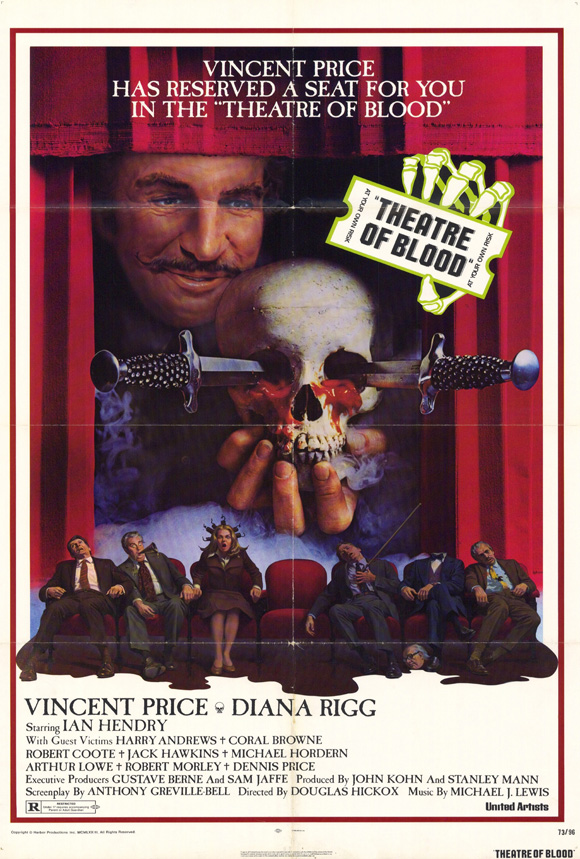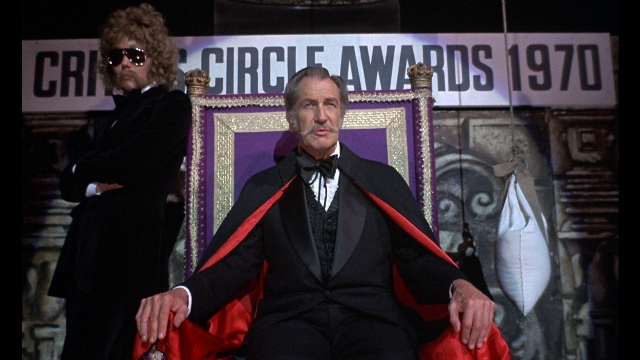
By the 1970’s, Vincent Price had moved on from Roger Corman’s Edgar Allan Poe pictures to British horror films that leaned toward the camp. The new pattern was firmly established by The Abominable Dr. Phibes (1971), Robert Fuest’s dazzling and bizarre black comedy hit about a disfigured physician seeking revenge for his wife’s death. In the film, Price murders a number of noted British character actors using methods both elaborate and sadistic. The film was followed by Dr. Phibes Rises Again (1972), as well as the almost identically structured Theatre of Blood (1973) and Madhouse (1974). Of the films in this quasi-series, Theatre of Blood is the best. It isn’t as pretty to look at as The Abominable Dr. Phibes (Fuest, who also directed The Final Programme, had an eye for the colorful and surreal), but director Douglas Hickox (Entertaining Mr. Sloane) does lend the proceedings a visual impact and immediacy that some of Price’s other films in this decade lacked. Theatre of Blood also has a secret weapon in co-star Diana Rigg (The Avengers series, On Her Majesty’s Secret Service), whose high standards often kept her away from silly little horror films like this. (Rigg can currently be seen stealing the show on Game of Thrones.) It’s likely that what drew Rigg to the project wasn’t the opportunity to work with Price, who, although beloved, was by now firmly linked to hammy spoofs, having appeared on the Batman TV series, Red Skelton, and The Brady Bunch, in addition to increasingly cheap B-movies like Dr. Goldfoot and the Girl Bombs (1966). No, it was probably the literate script by Anthony Greville-Bell (The Strange Vengeance of Rosalie), which is explicitly a satire on the world of the theater – a world with which Rigg was very familiar.
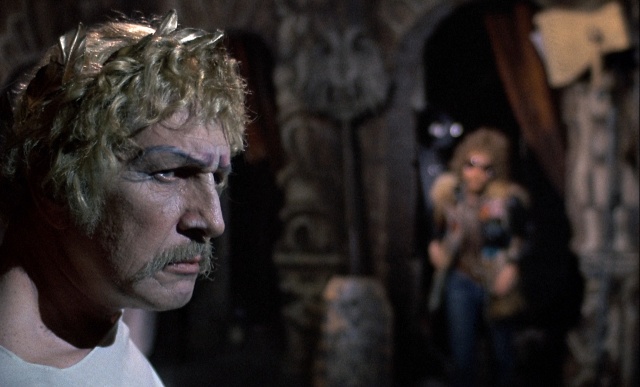
Vincent Price, as Edward Lionheart, performs Marc Antony’s speech from “Julius Caesar”: “I come to bury Caesar, not to praise him.”
The gimmick of Theatre of Blood is that all the murders committed by the vengeful ex-actor Edward Lionheart (Price) are rooted in Shakespeare. This makes the creative slayings a bit more entertaining than in Price’s other films of the period because we are trying to see how he’s going to, for example, turn The Merchant of Venice into something bloody. The backstory comes out gradually, but eventually we learn that Lionheart was an ill-respected actor who believed that his season of performing an exhaustive list of Shakespeare plays would garner the coveted Critics Circle Award for 1970. The members of the Critics Circle, however, have always found Lionheart’s performances to be old-fashioned and scenery chewing. When he fails to win the award, Lionheart crashes a private gathering of the critics, steals the award, excoriates them, delivers a bit of Hamlet’s “To Be or Not to Be” soliloquy, and jumps off the balcony and into the Thames. It’s a tour de force scene for Price, who must have related to Lionheart’s banishment from critical praise. In a funny moment late in the film, Price says of a ham sandwich: “My reputation.” Rather than drowning in the Thames, Lionheart is rescued by a band of mentally unbalanced alcoholic vagabonds (“meths drinkers,” as the credits call them), whom he accepts as his disciples – the groupies he never had in his theatrical career. He’s also reunited with his daughter, Edwina (Rigg), who witnessed his leap into the Thames. Disguising herself as a mustachioed (and possibly gay) hippie, Edwina aids her father in punishing the critics who refused to give him the Critics Circle Award.
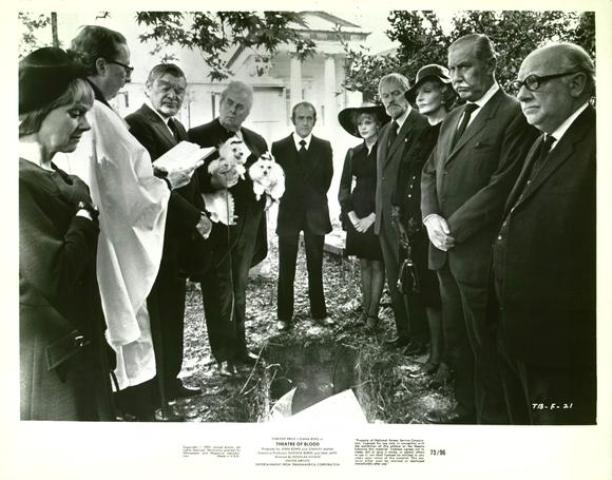
Members of the Critics Circle gather to mourn one of Lionheart’s victims.
One of the critics, Peregrine Devlin (Ian Hendry, Get Carter), is the first to notice the Shakespearean pattern to the deaths of members of the circle: first George Maxwell (Michael Hordern, Demons of the Mind) is stabbed by a mob of homeless he’s trying to evict from his tenement, a “Julius Caesar starring Edward Lionheart” poster on the wall; then, at Maxwell’s funeral, the wonderfully named Hector Snipe (Dennis Price, Twins of Evil) arrives as a bloody corpse dragged behind a horse, in the manner of Hector in Troilus and Cressida. Looking back at the infamous season of Shakespeare performed by Lionheart, Devlin sees that these were the first two plays performed, with many more to follow (conveniently, there’s one play for each critic). This turns Theatre of Blood into a macabre game in which the audience can participate, reaching back into their knowledge of Shakespeare. But some of the choices are a little obscure, particularly Cymbeline, a play which is seldom performed these days, and which seems to be here for the sole reason that its plot includes a decapitation. (It seems odd that one of Shakespeare’s bloodiest plays, Macbeth, isn’t included – but perhaps stabbing someone while they sleep just isn’t cinematically interesting.) The murders not only recreate Lionheart’s final season as an actor, but also provide Price his own repertoire of the Bard, giving him the opportunity to perform key scenes from the likes of Othello, Richard III, Titus Andronicus, and King Lear, sometimes in elaborate makeup and costumes. Dead to the world, plotting from beneath the stage of an abandoned theater (which, we should remember, is called “Hell” in theatrical parlance), the wronged Lionheart pores over his personal scrapbook and takes comfort in the love of his daughter and the blind adoration of his deranged, drunken audience. Frequently he walks the boards recreating some of his great roles, his daughter joining him. Perhaps this film comes closer to the Phantom of the Opera inspiration behind Dr. Phibes, but it’s also an unusual horror film in the deep levels of its meta-theatrics. At one point, Edwina lures to the stage Trevor Dickman (Harry Andrews, Moby Dick) – “It’s living theater, with audience participation” – encouraging him to perform lines from The Merchant of Venice. She casually tells him, “We’ve made several alterations to the script and one rather large cut.” This involves Edward Lionheart actually taking his “pound of flesh” from Dickman, removing his still-steaming heart. When Lionheart places the organ on a scale, he notes with dismay that it’s two ounces over a pound – and cuts it down some more, like a butcher in a butcher shop. Later when Devlin examines the victim, he says, “It’s Lionheart all right. Only he would have the temerity to rewrite Shakespeare.”
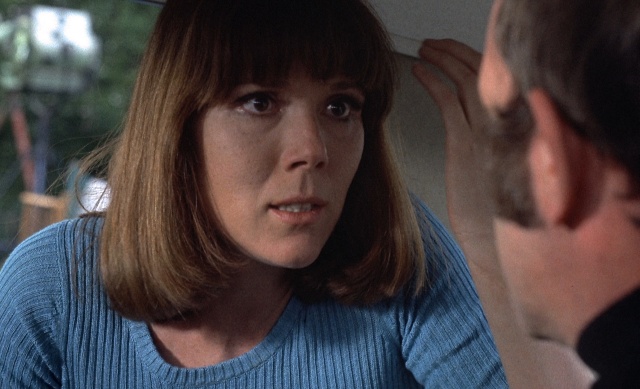
Edwina Lionheart (Diana Rigg) lures an unsuspecting Devlin (Ian Hendry) into her father’s clutches.
R-rated in the States (where it was distributed by United Artists), Theatre of Blood has a nasty edge to its black comedy, notably in the gross-out showstopper where Lionheart force-feeds one critic (Robert Morley, Around the World in 80 Days) his beloved poodles, baked in a pie. As a dog lover, this scene is pretty hard for me to watch, even though it’s done in the most outrageous manner possible: as a mock game show hosted by Price called “This is Your Dish.” (The scene is inspired by Titus Andronicus.) Although the screenplay could stand to distinguish its many victims a little further – many of them are just stuffy critics – the cast is loaded with ringers; I haven’t mentioned that former bombshell Diana Dors (Blonde Sinner) has a small role as an unwitting Desdemona, nor that the secretary to the Critics Circle is played by Hammer ingenue Madeline Smith (The Vampire Lovers, Frankenstein and the Monster From Hell). The cast also includes Coral Browne (Auntie Mame), who would fall in love with Price during filming; never mind that their big scene together involves him electrocuting her. They married in 1974, and remained together. But Price and Rigg own the proceedings, somehow meeting each other halfway. Rigg camps it up a bit – particularly when in disguise – and Price reaches rare emotional depths, climaxing in a recreation of the tragic ending of King Lear, where Edward Lionheart becomes Lear, and Edwina his beloved daughter Cordelia. It’s clever stuff.
Theatre of Blood is newly available on Blu-Ray from Twilight Time.
